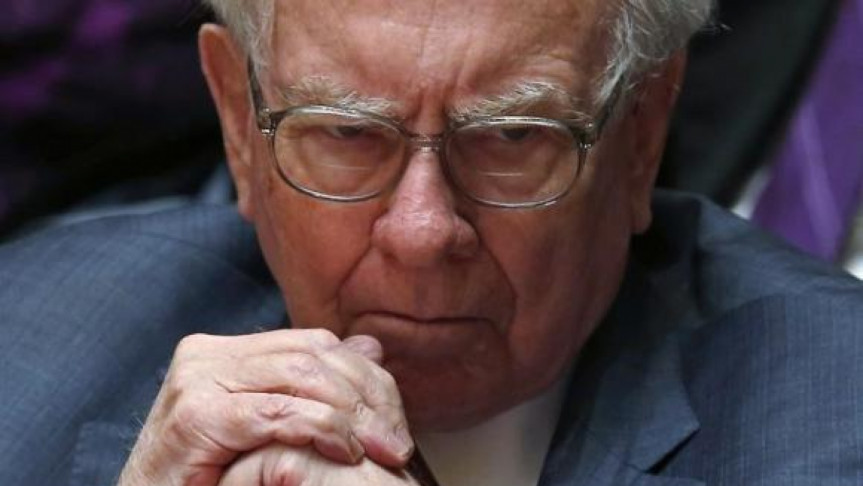Buffett looks to succession

New York: In his 50 years at the helm of Berkshire Hathaway Inc, Warren Buffett has transformed a failing textile company into a sprawling conglomerate that has vastly outperformed most of the rest of corporate America. But he now says: Do not expect a repeat of that outperformance in the next 50. In the 84-year-old’s annual shareholder letter released on Saturday, Buffett said Berkshire has grown so large - 751,000 times its original net worth per share - that the future pace of gains “will not come close” to those of the past.
“The numbers have become too big,” Buffett wrote. “I think Berkshire will outperform the average American company, but our advantage, if any, won’t be great.
Within 10 to 20 years, Buffett said, Berkshire’s girth could require whoever then runs the Omaha, Nebraska-based company to consider steps he has resisted, such as paying dividends or conducting “massive” share repurchases.
Buffett, also addressing one of the more pressing topics at Berkshire, said he and his board of directors “believe we now have the right person to succeed me as CEO,” likely for a decade or more, and who in some respects “will do a better job than I am doing.”
While Buffett did not name that person, Berkshire Vice Chairman Charlie Munger, 91, said Greg Abel and Ajit Jain, two top Buffett lieutenants, would be prime candidates.
Abel, 52, runs Berkshire Hathaway Energy. Jain, 63, has been Buffett’s top insurance executive for three decades.
A successor could also be female: Buffett said “gender should never decide who becomes CEO.”
And Todd Combs and Ted Weschler, who run some Berkshire investments, “can be of particular help to the CEO in evaluating acquisitions,” he added.
“You’ve got such good candidates,” said Thomas Russo, a principal at Gardner, Russo & Gardner, which invests 12 percent of its $10 billion of assets in Berkshire. “I think they’ll adopt a different capital structure approach, which will include a healthy, healthy large dividend.”
OPERATING RESULTS MISS ESTIMATES
Buffett is preparing in May to celebrate 50 years of running Berkshire, whose market value is now $363 billion.
On Saturday, Berkshire also reported a 17 percent drop in fourth-quarter profit, to $4.16 billion, or $2,529 per Class A share, from $4.99 billion, or $3,035, a year ago, as investment gains and results from insurance underwriting declined.
Operating profit rose 5 percent to $3.96 billion, or $2,412 per share, from $3.78 billion, or $2,297.
For all of 2014, profit rose 2 percent to $19.87 billion, while operating profit increased 9 percent to $16.55 billion. Revenue rose 7 percent $194.67 billion.
Book value per share, which Buffett considers a good measure of Berkshire’s worth, rose 8.3 percent to $146,186 but lagged gains in the Standard & Poor’s 500 for the fifth time in six years.
Despite the big numbers, Berkshire had some problems.
Buffett lamented the performance of the BNSF railroad, saying it “disappointed many of its customers” with congestion on its rail lines caused by bad weather, amid rising oil shipments and a bumper grain harvest.
He also said he was “embarrassed” by taking too long to exit a $2.3 billion investment in Tesco Plc, a British retailer that became mired in an accounting scandal.
Berkshire lost $444 million on Tesco, but Buffett said that’s just 0.2 percent of its net worth.
MOTHER LODE OF OPPORTUNITIES
Berkshire owns more than 80 companies, such as Geico insurance and Dairy Queen ice cream, and $117.5 billion of equity investments in such companies as Wells Fargo & Co, Coca-Cola Co, American Express Co and IBM Corp.
Buffett remains on the prowl for acquisitions, and with $63.27 billion of cash could make big purchases, which he calls “elephants,” while preserving a $20 billion cash cushion.
Despite spending $7.8 billion on 31 acquisitions in 2014, Berkshire has not bought an elephant since paying $12.25 billion to buy half of ketchup maker H.J. Heinz Co in 2013.
And while Buffett has said he may shop more in Germany, after on Feb. 20 agreeing to buy a German motorcycle accessories retailer, Berkshire’s main focus will remain at home.
“Though we will always invest abroad as well, the mother lode of opportunities runs through America,” he wrote.
Buffett’s letter retained the folksy tone that have helped make him popular among investors.
Talking about his See’s Candies business, which requires little capital investment, Buffett compared the company’s profits to “rabbits breeding.”
And Buffett said that at Berkshire’s annual meeting last year, part of a weekend he calls “Woodstock for Capitalists,” shareholders bought 10,000 bottles of Heinz ketchup with Buffett or Munger on the labels. (Buffett’s cost $2, Munger’s $1.50.)
This year, Buffett said Heinz will also be selling mustard as well as ketchup. “Buy both!” he exhorted.

 Reuters
Reuters




